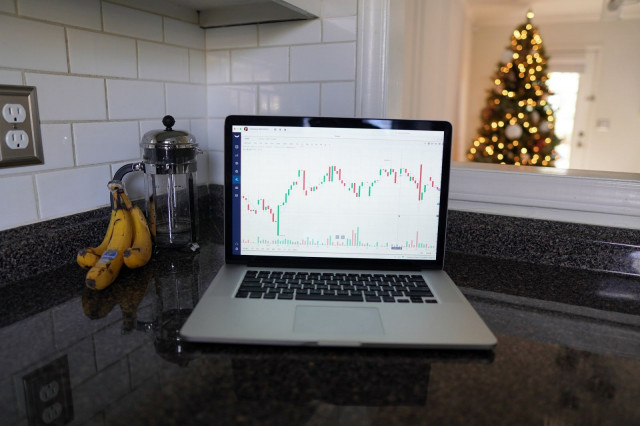Welcome to the exciting world of forex trading! Whether you're an aspiring investor, a curious individual, or simply someone looking for new opportunities to grow your wealth, this blog post is here to guide you through the fundamentals of forex trading.

In this article, we will explore what forex trading is all about, its benefits, and key terms you should know. We'll also discuss how to choose a broker and open an account, develop a solid forex trading strategy, manage risks effectively, and offer some tips for success along the way. So buckle up and get ready to embark on an exhilarating journey into the world of forex trading!
Understanding Forex Market and Forex Trading
Forex trading, also known as foreign exchange trading or currency trading, is the process of buying and selling currencies in order to make a profit. Unlike traditional stock markets, which operate during specific hours, the forex market is open 24 hours a day from Monday to Friday. This means that you can trade currencies at any time that suits you best.
At its core, forex trading involves speculating on the value of one currency against another. For example, if you believe that the value of the Euro will rise against the US Dollar, you would buy Euros with Dollars. If your prediction turns out to be correct and the Euro does indeed increase in value against the Dollar, you can then sell your Euros for a higher price and make a profit.
One key aspect of forex trading is leverage. Leverage allows traders to control larger positions with smaller amounts of capital. While this can amplify potential profits, it's important to remember that it also increases risk.
The forex market operates through decentralized exchanges located around the world. The most significant financial centers for forex trading include London, New York City, Tokyo, Sydney and Frankfurt.
Now that we have covered what forex trading entails at a basic level let's move on to exploring its numerous benefits!
Key Terms to Know in Forex Trading
When diving into the world of forex trading, it's important to familiarize yourself with some key terms that are commonly used. Understanding these terms will help you navigate through the complexities of the market and make informed decisions. Let's take a look at some of the essential terms every beginner should know.
1. Pips: A pip refers to the smallest unit by which a currency pair can change in value. It is typically represented by four decimal places or two decimal places for certain pairs like JPY.
2. Lot size: Lot size determines how much currency you are buying or selling in a trade. Standard lots consist of 100,000 units, while mini lots consist of 10,000 units and micro lots consist of 1,000 units.
3. Spread: The spread is the difference between the bid price (selling price) and ask price (buying price) of a currency pair. This is essentially what brokers charge as their fee for facilitating trades.
4. Leverage: Leverage allows traders to control larger positions with smaller amounts of capital by borrowing funds from their broker. However, it's important to use leverage responsibly as it amplifies both profits and losses.
5. Stop loss: A stop loss order is an instruction given to your broker to automatically close your position when prices reach a certain level predetermined by you. This helps limit potential losses if markets move against your trade.
6. Risk-to-Reward Ratio: The risk-to-reward ratio represents the amount you are willing to risk on a trade compared to your expected profit target if successful.
It assesses whether entering into a particular trade makes financial sense based on its potential return versus risk exposure.
As you progress in your forex trading journey, you'll come across many more terms, but understanding these basics will give you a solid foundation.
The more knowledgeable you become about these concepts, the better equipped you'll befor making informed decisions and navigating the forex market with confidence. So, take your time to
Choosing a Broker and Opening an Account
When it comes to forex trading, is crucial. Your broker will be your partner in navigating the complex world of currency markets, so you want to ensure that you make the best choice possible.
Consider what kind of trading platform suits your needs. Do you prefer a user-friendly interface or more advanced features? Take some time to research different brokers and their platforms to find one that aligns with your preferences.
Next, evaluate the reputation and reliability of potential brokers. Look for reviews from other traders and check if they are regulated by reputable financial authorities. This will give you peace of mind knowing that your funds are in safe hands.
Another important factor to consider is customer support. forex markets operate 24/7, so having access to responsive customer service can make a huge difference when issues arise.
Before opening an account with a broker, take advantage of any demo accounts they offer. These allow you to test out their platform and practice trading strategies without risking real money.
Pay attention to fees and commissions charged by brokers as these can eat into your profits over time.
By taking the time to choose a reliable broker with suitable offerings for your trading style, you set yourself up for success in the forex market. So do thorough research before making your decision!

Developing a Trading Strategy
When it comes to forex trading, having a well-defined strategy is crucial for success. A trading strategy provides you with a roadmap and helps you make informed decisions based on market analysis. So, how do you go about developing a trading strategy?
Identify your goals and risk tolerance levels. Are you looking for short-term gains or long-term stability? Understanding your objectives will help shape your strategy accordingly.
Next, familiarize yourself with different types of analysis – technical and fundamental. Technical analysis involves studying charts, patterns, and indicators to predict future price movements. On the other hand, fundamental analysis looks at economic factors that can impact currency values.
Once you have chosen an approach - technical or fundamental - it's time to fine-tune your strategy by incorporating specific tools and techniques. This could include identifying key support and resistance levels, using trend lines or moving averages, or keeping track of important economic news releases.
Remember that no strategy guarantees profits all the time; markets are dynamic and constantly changing. It's essential to continuously evaluate and adjust your approach as needed.
Practice! Utilize demo accounts offered by brokers to test out your strategies in real-time market conditions without risking actual funds.
Developing a solid trading strategy takes time and effort but is worth every bit of investment. By understanding your goals, choosing the right analytical approach, and honing specific techniques/tools best suited for you personally while staying adaptable in response to market changes – success becomes much more achievable in the world of forex trading!
Risk Management and Tips for Success
When it comes to forex trading, managing risk is crucial for long-term success. Here are some tips to help you navigate the market effectively and minimize potential losses.
1. Set Realistic Goals: Before diving into forex trading, determine your financial goals and be realistic about what can be achieved. This will help you set appropriate expectations and avoid taking unnecessary risks.
2. Use Stop-Loss Orders: A stop-loss order is a powerful tool that automatically closes a trade if the price reaches a specified level. By setting stop-loss orders, you limit potential losses in case the market moves against your position.
3. Diversify Your Portfolio: It's important not to put all your eggs in one basket. Diversifying your investments across different currency pairs can help spread risk and protect against sudden market fluctuations.
4. Stay Informed: Keep up-to-date with economic news, political events, and global trends that could impact currency values. This information can give you an edge in making informed trading decisions.
5. Practice Risk Management Techniques: Implementing proper risk management techniques such as allocating only a small portion of your capital per trade or using leverage responsibly can safeguard your account from significant losses.
6. Maintain Discipline: Emotional decision-making can lead to impulsive trades and disastrous outcomes in forex trading. Stick to your strategy, follow predetermined rules, and don't let fear or greed dictate your actions.
Remember, successful forex trading requires patience, discipline, continuous learning, and adapting strategies based on changing market conditions.
Forex Trading Signals
Forex Telegram signals are alerts or notifications sent by professional traders or automated systems to inform traders about potential trading opportunities in the forex market. These forex Telegram signals typically include key information such as the currency pair, entry price, stop-loss level, and take-profit target. The purpose of these signals is to assist traders in making informed trading decisions and leveraging profitable opportunities.
Forex signal providers often utilize various technical analysis tools, fundamental analysis, and their expertise to generate these signals. Traders can subscribe to these services and receive real-time notifications on their preferred communication channels, such as email, SMS, or instant messaging platforms like Telegram. By following these signals, traders can benefit from the experience and knowledge of seasoned professionals while saving time on market analysis.
However, it's essential to note that forex signals should not be taken as guaranteed success or a substitute for independent analysis. Traders should exercise caution and conduct their own research before executing trades based solely on signals. It's crucial to consider factors such as market conditions, risk management strategies, and personal trading goals when utilizing forex signals effectively. With a disciplined approach and proper risk management practices, Telegram forex trading signals can be valuable tools to enhance one's trading journey and increase the potential for profitable outcomes.
Conclusion
Forex trading can be an exciting and potentially lucrative venture for beginners. By understanding the basics of forex trading, such as how it works and the key terms involved, you can start your journey towards becoming a successful trader.
One of the main benefits of forex trading is its accessibility. With online platforms and brokers readily available, anyone with an internet connection can participate in this global market. Additionally, forex trading offers high liquidity and the opportunity to trade 24 hours a day, allowing for flexibility in your trading activities.
When starting out in forex trading, it's important to choose a reputable broker and open an account that suits your needs. Take the time to research different brokers, and consider their fees and customer support options before making a decision.
Developing a solid trading strategy is another crucial step on your forex journey. This involves analyzing market trends, setting goals, determining entry and exit points, as well as managing risk effectively. Remember that consistency is key when it comes to implementing your strategy – stick to your plan even during volatile market conditions.
Speaking of risk management, it's essential for beginners to understand that losses are inevitable in forex trading. However, by employing proper risk management techniques such as setting stop-loss orders or using leverage wisely, you can protect yourself from significant losses while maximizing potential profits.
To thrive in forex trading over time requires ongoing learning and practice. Stay updated with economic news releases that may impact currency prices; follow industry experts' insights; utilize demo accounts offered by brokers to test strategies without risking real money.
Forex trading provides ample opportunities for beginners who are willing to put in the effort required for success. Gaining knowledge about various aspects of this dynamic market along with developing effective strategies while managing risks smartly would position aspiring traders favorably on their path towards profitability! So why not take the plunge into forex trading today? Start small but dream big - who knows where this exciting journey might lead you!





